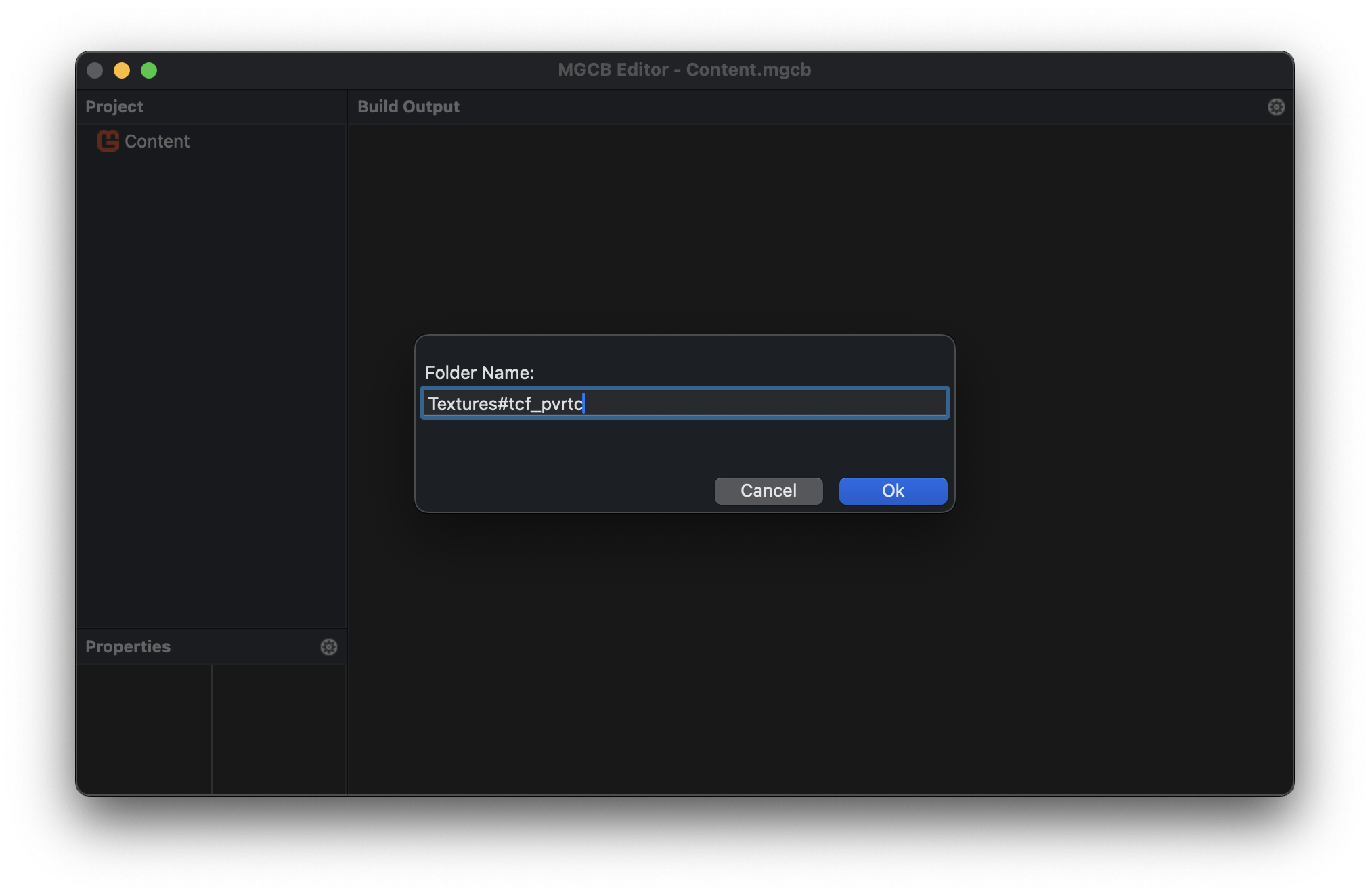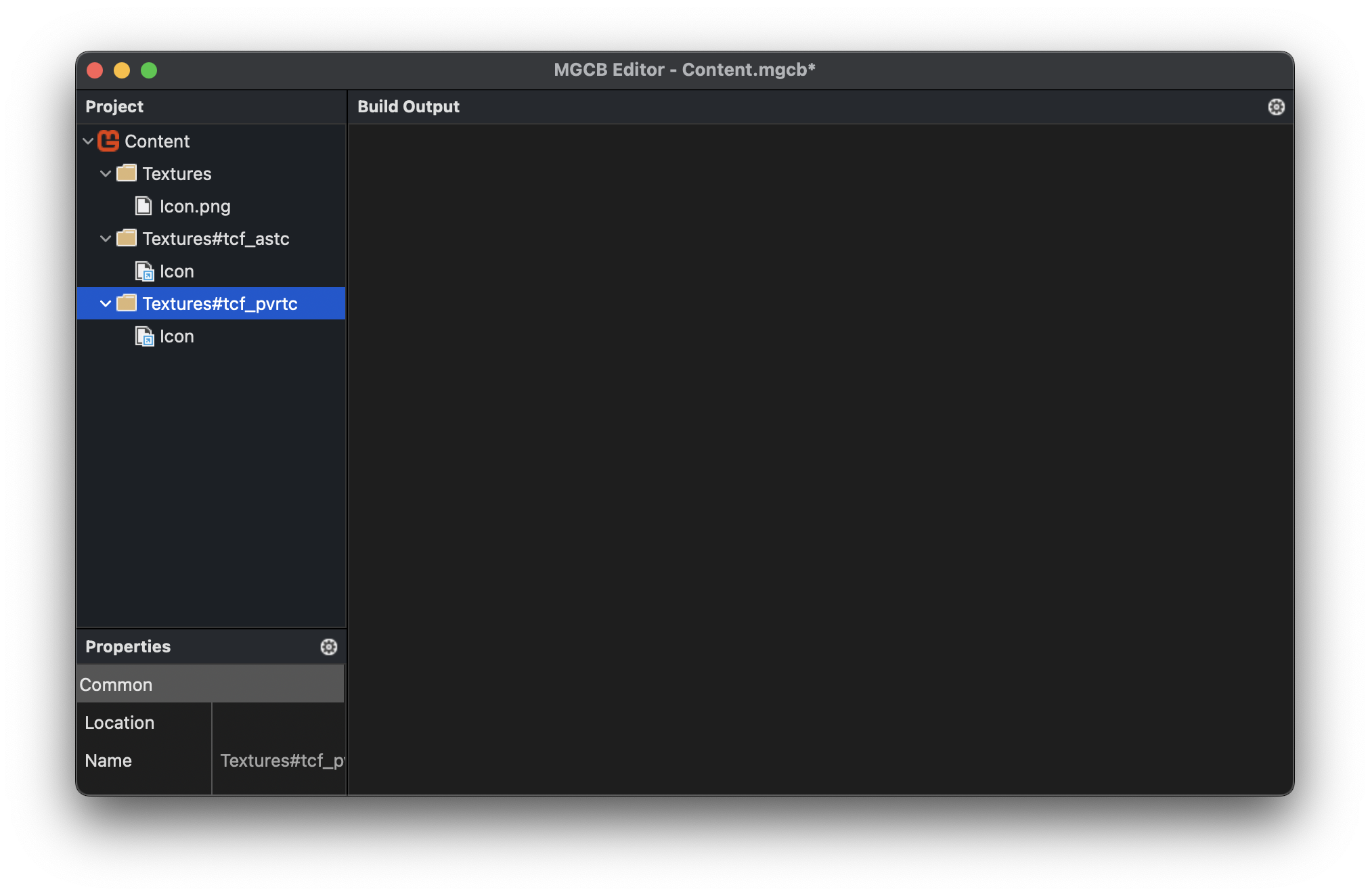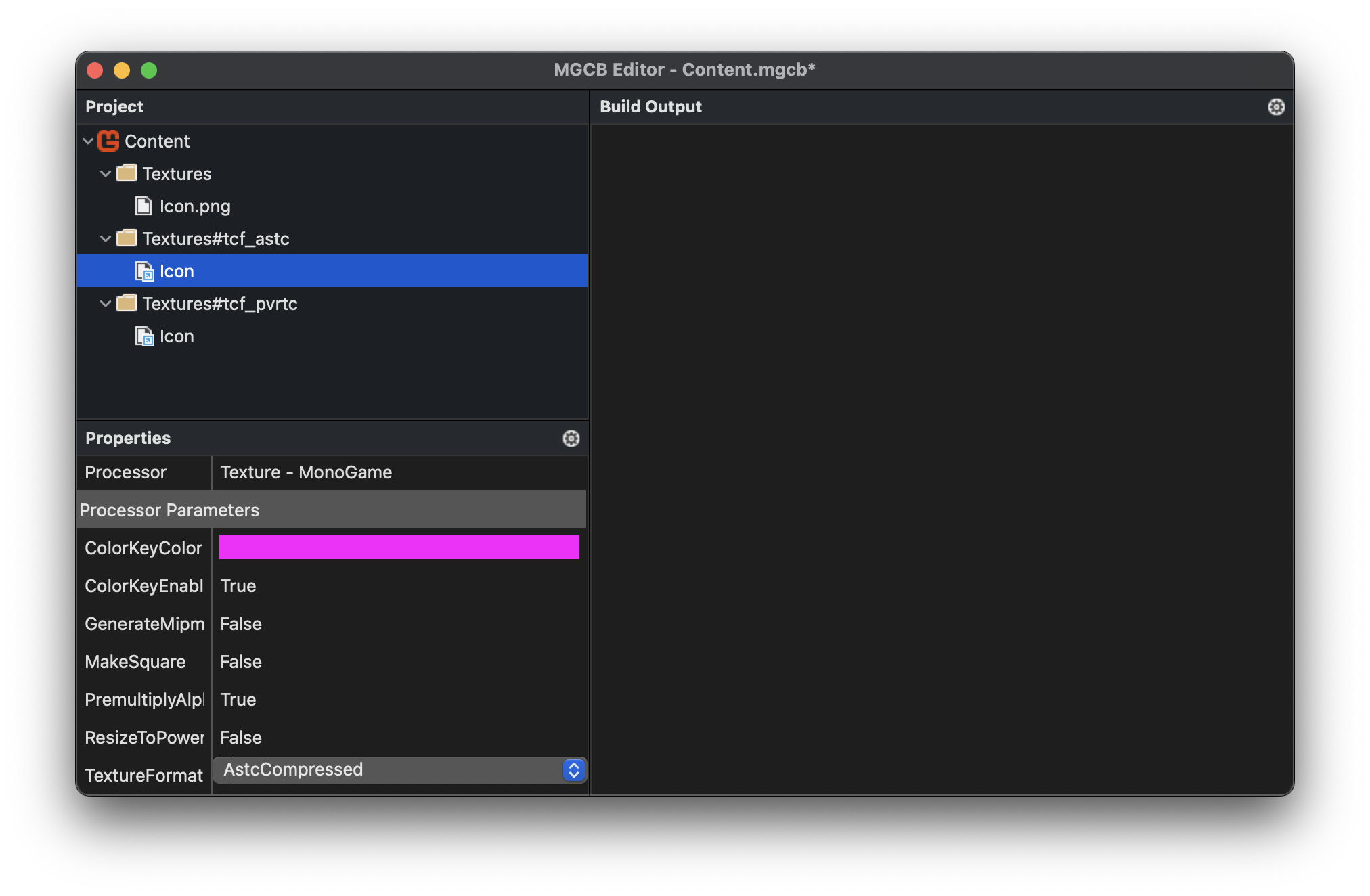How to package Textures for Android?
Describes how to support multiple Texture Compression formats for Android.
The Android ecosystem is unique in that the hardware it runs on can be from many different manufacturers. Unlike iOS or PC, you cannot always guarantee what graphics card a user will be using. For this reason, Android needs to have some special attention when shipping your game.
Texture Compression
As stated in "Why use the Content Pipeline", you need to be aware of the performance limitations on mobile devices. The graphics cards on mobile phones do not have the same kind of capabilities as those on the PC or Consoles. They usually have less memory and less power. So you need to make use of what you have in a more efficient way.
One of these ways is to use Texture Compression. As stated in "Why use the Content Pipeline", this allows you to fit more textures on the graphics card than you could if you just used raw RGBA textures.
How Android deals with textures
Fortunately, the Android engineers recognized that supporting all of these texture compression formats was not an easy task. So, with the introduction of the .aab file format, they added the ability to add multiple texture format files to the package. The way the .aab works is that it is not the final .apk. The final .apk will be built from the .aab when the game is delivered to the en- user device.
As a result, not all of the files in the .aab will make it to the device. It will filter out things like .so files for other cpu types, and yes, texture formats.
The .aab supports the following directory suffixes for texture compression:
| Texture Format | Suffix |
|---|---|
| PVRTC | #tcf_pvrtc |
| ATC | #tcf_atc |
| ASTC | #tcf_astc |
| S3TC | #tcf_s3tc |
| DXT1 | #tcf_dxt1 |
| ETC1 | #tcf_etc1 |
| ETC2 | #tcf_etc2 |
MonoGame has its own TextureProcessorOutputFormat enumeration. It describes the type of Texture Compression you use when processing an image.
The following table shows you how to map that to the Suffix:
| TextureProcessorOutputFormat | Suffix |
|---|---|
| PvrCompressed | #tcf_pvrtc |
| AtcCompressed | #tcf_atc |
| AstcCompressed | #tcf_astc |
| DxtCompressed | #tcf_s3tc |
| Etc1Compressed | #tcf_etc1 |
| EtcCompressed | #tcf_etc2 |
| Compressed or Color | No Suffix |
Adding Texture Compression Suffixes
With the latest MonoGame we added support for being able to have one texture with multiple outputs. Previously it would only build the last item, but this has been fixed.
In the Content Editor:
- Add a new folder for your desired Suffix. This is usually in the form of
Textures<suffix>.
- Right-click on the new folder and Add an Existing File.
- Select the file you want to use for this Suffix and Add it

- In the Properties of the new file change the TextureFormat to the one that matches the desired Suffix.

In the .mgcb file directly you can do the following
/processorParam:TextureFormat=PvrCompressed
/build:Textures/LogoOnly_64px.png;Textures#tcf_pvrtc/LogoOnly_64px
As documented the /build command takes an optional <destination_filepath> after the <content_filepath>. We can use this to provide the target folder for our output.
So in the example above, the LogoOnly_64px.png file will be compressed using PvrCompressed and then the output will end up in Textures#tcf_pvrtc.
Important
Some texture formats have specific size requirements. For example PVRTC Compressed Textures MUST be a Power of 2 and Square (e.g 1024x1024). Many others need to be Power of 2. It is recommended that you make all your textures Power of 2 just to make life easier.
Supporting Multiple Texture Compression Types
To allow your game to work on as many devices as possible we need to support multiple compression formats. Now that we know how to specify a specific texture compression format for a texture, how do we go about supporting multiple formats? It is really quite simple. We can duplicate the entry for each texture and specify a different /processorParam:TextureFormat and output path. For example, the following code is how we would build both pcrtc and dxt formats.
#begin Textures/LogoOnly_64px.png for PvrCompressed
/importer:TextureImporter
/processor:TextureProcessor
/processorParam:TextureFormat=PvrCompressed
/build:Textures/LogoOnly_64px.png;Textures#tcf_pvrtc/LogoOnly_64px
#begin Textures/LogoOnly_64px.png for DxtCompressed
/importer:TextureImporter
/processor:TextureProcessor
/processorParam:TextureFormat=DxtCompressed
/build:Textures/LogoOnly_64px.png;Textures#tcf_s3tc/LogoOnly_64px
In the Content Editor:
- Add a new folder for your desired Suffix. This is usually in the form of
Textures<suffix>.
- Right click on the new folder and Add an Existing File.
- Select the file you want to use for this Suffix and Add it

- In the Properties of the new file change the TextureFormat to the one that matches the desired Suffix.

As you can see, supporting multiple texture compression formats is quite easy.
Sample .mgcb
#begin Textures/LogoOnly_64px.png
/importer:TextureImporter
/processor:TextureProcessor
/processorParam:ColorKeyColor=255,0,255,255
/processorParam:ColorKeyEnabled=True
/processorParam:GenerateMipmaps=False
/processorParam:PremultiplyAlpha=True
/processorParam:ResizeToPowerOfTwo=True
/processorParam:MakeSquare=False
/processorParam:TextureFormat=PvrCompressed
/build:Textures/LogoOnly_64px.png;Textures#tcf_pvrtc/LogoOnly_64px
Using Android Asset Packs
The Google Play Store has some fairly strict limitations on package sizes for Android apps. However there are ways to extend these limits for large games and apps, which are known as Asset Packs. Simply put, an Asset Pack is a way to organize your game content/assets into separate pieces which can be downloaded shortly after installation or dynamically at runtime. For most games using the Install Time packs are the best option.
Using them in your game can be quite straight forward. It only requires a little bit of MSBuild markup in your Android platform .csproj.
<Target Name="_MoveContentIntoPacks" AfterTargets="IncludeContent">
<ItemGroup>
<AndroidAsset Update="Content/Music/**/*.*" AssetPack="MyGameAssets" />
</ItemGroup>
</Target>
This adds an MSBuild target to your project which will process all the items in the Content/Music folder and subfolders. It will place them in an Asset Pack called MyGameAssets. You can change the name of this pack as you wish. By default, this will be an InstallTime pack. So it will be installed at the same time as your game is. There is no need to do anything else, the assets will be placed in the usual location and opened via Content.Load<T>.
If you are using dynamic delivery and install packs at runtime, you will need to open the content from a different location. This is out of scope for this document. If you want to learn more about how to use these features please check out the following links:
Sample .mgcb with Multiple Compression Formats
#----------------------------- Global Properties ----------------------------#
/outputDir:bin/$(Platform)
/intermediateDir:obj/$(Platform)
/platform:Android
/config:
/profile:Reach
/compress:False
#-------------------------------- References --------------------------------#
#---------------------------------- Content ---------------------------------#
#begin ContentFont.spritefont
/importer:FontDescriptionImporter
/processor:FontDescriptionProcessor
/processorParam:PremultiplyAlpha=True
/processorParam:TextureFormat=Compressed
/build:ContentFont.spritefont
#begin Textures/LogoOnly_64px.png
/importer:TextureImporter
/processor:TextureProcessor
/processorParam:ColorKeyColor=255,0,255,255
/processorParam:ColorKeyEnabled=True
/processorParam:GenerateMipmaps=False
/processorParam:PremultiplyAlpha=True
/processorParam:ResizeToPowerOfTwo=True
/processorParam:MakeSquare=False
/processorParam:TextureFormat=Compressed
/build:Textures/LogoOnly_64px.png
#begin Textures/LogoOnly_64px.png
/importer:TextureImporter
/processor:TextureProcessor
/processorParam:ColorKeyColor=255,0,255,255
/processorParam:ColorKeyEnabled=True
/processorParam:GenerateMipmaps=False
/processorParam:PremultiplyAlpha=True
/processorParam:ResizeToPowerOfTwo=True
/processorParam:MakeSquare=False
/processorParam:TextureFormat=PvrCompressed
/build:Textures/LogoOnly_64px.png;Textures#tcf_pvrtc/LogoOnly_64px
#begin Textures/LogoOnly_64px.png
/importer:TextureImporter
/processor:TextureProcessor
/processorParam:ColorKeyColor=255,0,255,255
/processorParam:ColorKeyEnabled=True
/processorParam:GenerateMipmaps=False
/processorParam:PremultiplyAlpha=True
/processorParam:ResizeToPowerOfTwo=True
/processorParam:MakeSquare=False
/processorParam:TextureFormat=DxtCompressed
/build:Textures/LogoOnly_64px.png;Textures#tcf_s3tc/LogoOnly_64px
#begin Textures/LogoOnly_64px.png
/importer:TextureImporter
/processor:TextureProcessor
/processorParam:ColorKeyColor=255,0,255,255
/processorParam:ColorKeyEnabled=True
/processorParam:GenerateMipmaps=False
/processorParam:PremultiplyAlpha=True
/processorParam:ResizeToPowerOfTwo=True
/processorParam:MakeSquare=False
/processorParam:TextureFormat=AtscCompressed
/build:Textures/LogoOnly_64px.png;Textures#tcf_atsc/LogoOnly_64px